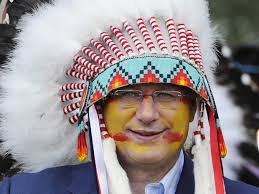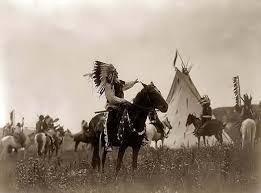 By Ray Rivers
By Ray Rivers
August 9, 2014
BURLINGTON, ON
My dad once gave me an Indian headdress he’d bought in northern Ontario. It was just a kid’s version, an imitation, and not very flowing – but he bought it at an Indian artifact shop and it was pretty special. It became a favourite when playing ‘cowboys and Indians’ back then, though I’m a little uncertain about the political correctness of any of that today.

Prime Minister Stephen Harper wearing an Indian headdress. He has been a friend to the aboriginal community.
In Canada our aboriginals face a host of issues such that a celebrity donning a piece of traditional tribal costume might hardly be worth a footnote in the list of society’s grievances. Life on the reserves is being challenged by recent changes the Harper government made to the environmental and fisheries habitat protection laws, in order to steamroll oil and gas pipelines over lands claimed by these first nations. And life for so many, on a number of the reserves, is barely habitable by most standards.
 In fact, Canada has been criticized by the UN for its aboriginal policies, and with some legitimacy. One needs to only look at incarceration rates in Saskatchewan and Manitoba to see that there are problems. And, then there are all the other issues: inferior education, missing women from reserves, violence, alcohol and drug abuse, increasing obesity rates and racial discrimination that still occurs in parts of the country.
In fact, Canada has been criticized by the UN for its aboriginal policies, and with some legitimacy. One needs to only look at incarceration rates in Saskatchewan and Manitoba to see that there are problems. And, then there are all the other issues: inferior education, missing women from reserves, violence, alcohol and drug abuse, increasing obesity rates and racial discrimination that still occurs in parts of the country.
The root of all these problems lies with the Indian Act, Canada’s saddest piece of legislation. Back in its day (1876) Sir John A. MacDonald heralded the Act and its goal of fully assimilating Canada’s aboriginals. The purpose of the act was to administer Indian affairs in such a way that Indian people would feel compelled to renounce their Indian status, leave the reserves and join the rest of society as ordinary Canadians – a process called ‘enfranchisement’.
I don’t want to pick on Sir John A. or any of the other prime ministers. The problems really started with all the treaties that the British signed as a well-meaning alternative to wars and the ultimate extermination of the natives. King George III, yes, the mad English King who was also responsible for the loss of the thirteen American colonies, signed a well-meaning Royal Proclamation in 1763, promising all kinds of good things to aboriginals. This may have been an over-reaction to his failures with the American colonialists or part of a plan to get Canada’s natives on-side for the oncoming US revolutionary war.
There have been numerous amendments to the Indian Act, which have brought a modicum of enlightenment to the legislation, and even an attempt (Trudeau) to abolish the Act. But the courts have generally blocked these attempts, falling back on the legislation, the old treaties or the Bill and Charter of Rights. Abolishing the Indian Act would likely require constitutional changes, much like the Canadian Senate, and out of the purview of the courts.
 Suffice it to say that there have been some positive amendments to the Act over the years, allowing status Indians the right to vote and eliminating discrimination against women who choose to marry outside their tribe. The process of ‘enfranchisement’, or ‘civilizing’, which gave us the horrific experience of residential schools, has mostly been brought to an end. In addition there has been progress on land claims. This topic is a complex web of issues to unweave, so please stay tuned for another column.
Suffice it to say that there have been some positive amendments to the Act over the years, allowing status Indians the right to vote and eliminating discrimination against women who choose to marry outside their tribe. The process of ‘enfranchisement’, or ‘civilizing’, which gave us the horrific experience of residential schools, has mostly been brought to an end. In addition there has been progress on land claims. This topic is a complex web of issues to unweave, so please stay tuned for another column.
In 2006 the Paul Martin minority government managed to get everybody, including the provinces, political parties and tribal organizations to achieve consensus on a program to improve the lives and standing of Canada’s aboriginals. In fact even after Martin’s government fell, and Harper became PM, the Kelowna Accord became law; though the delivery ended up being curtailed by the less-than-enthusiastic new PM (after all it wasn’t his invention). Still, Mr. Harper has come back to the spirit of Kelowna, more recently, introducing measures to improve aboriginal education.
Harper has also attempted, boldly, though unsuccessfully, to shift the ownership and full responsibility for the reserves from the Crown to the Indian tribes and their individual members. The notion was to empower aboriginals by privatizing the reserves’ land holdings and transitioning from the communal way in which bands now operate their activities on reserves. By ‘normalizing’ economic activities on reserves this might have been seen as just an alternate way of accomplishing the intent of the original Indian Act.
More recently however, the Harper government passed the ‘The First Nations Financial Transparency Act (FNFTA)’, requiring First Nations to disclose their financial statements and the salaries of band council officials. The argument is that this would provide greater transparency and allow band members to hold their leaders more accountable. Of course there were critics, as always, claiming that this was a higher standard than applied for most public officials.
But Harper had the angels on his side and scored an early win as the postings appeared on the government’s web site. In the tiny First Nation of Kwikwetlem (Coquitlam B.C.), with a band membership of 81, it turns out the contracted Chief, Ron Giesbrecht, got almost a million dollars remuneration from the band council. Apparently he was also the Director of Economic Development which earned him $80,000, plus ten percent of any business that came in. And an eight million dollars land settlement fell into his lap, giving him close to a million big ones, and tax free since he is a status Indian.
Initially the band council supported Giesbrecht, but that is an awful lot of money. The federal Minister of Aboriginal Affairs and Northern Development, Bernard Valcourt was outraged and other Canadians joined in the chorus of disapproval. Apparently his new contract with the band now excludes any provision for commissions. Nevertheless, Chief Giesbrecht would be a brave man should he decide to don a feathered bonnet at his band’s next festive occasion. That is unless he decides to give the money back to the band or donate it to some worthy cause. After all, as good a chief as he may be that is still a lot of money.
 Ray Rivers writes weekly on both federal and provincial politics, applying his more than 25 years as a federal bureaucrat to his thinking. Rivers was a candidate for provincial office in Burlington where he ran against Cam Jackson in 1995, the year Mike Harris and the Common Sense Revolution swept the province.
Ray Rivers writes weekly on both federal and provincial politics, applying his more than 25 years as a federal bureaucrat to his thinking. Rivers was a candidate for provincial office in Burlington where he ran against Cam Jackson in 1995, the year Mike Harris and the Common Sense Revolution swept the province.
BACKGROUND LINKS
Headdress More Headdress Even More Headdress War Bonnet
Indian Act Kelowna Accord More Kelowna Accord Harper’s Plan Big Bonus
Transparency Act More Transparency Even More Transparency



















Thanks for your comments and the update Gary and Tony.
These are Mr. Trudeau’s words from a National Post article:
“Actually, I wouldn’t keep the legislation in place. I would work with First Nations to make sure that a proper accountability act that would have disclosed any excesses we see, but is done in a way that is respectful of the First Nation communities.”
I understood the first sentence, but the mixing of tenses in the second makes comprehension a little more difficult. As per Gary, and I think Ray, what is wrong with transparency – no matter whose idea it is/was/will be?
I enjoyed your history of the Indian Act and at first I was disinclined to comment, since you seem to have modified your customary Harper-bashing in this piece.
However, your good pal, Justin Trudeau, opened his mouth yesterday and let some more nonsense dribble out and that brought out the writer in me. According to media accounts he would amend or scrap the new financial accountability legislation, after consulting with, guess who, the chiefs.
Who does he think he is aiding in this? I will bet there is not a member of a band in Canada (622 thereabouts) that isn’t grateful for the information this legislation has provided to them, other than some of the chiefs and other Indian councillors. Furthermore, it a democratizing statute in that it now gives every native the same rights enjoyed by non-natives; namely, to know what your elected officials earn. Mr. Trudeau needs to do more thinking before speaking. Natives do vote.
Secondly, I hope in some of your promised forthcoming native related columns you comment on what is an obvious flaw to making headway in improving the lives of our natives; that is, the discord amongst the natives themselves. They do not speak with a unified voice and the good educational improvements that the AFN negotiated with the federal government fell by the wayside because of fractious in-fighting amongst the bands. This also torpedoed the attempts to improve the economic development opportunities that were on the table.